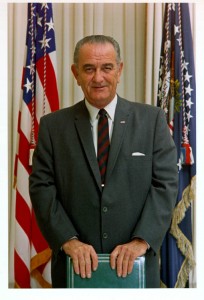FDR changed the way Americans thought about the role of government by using government as the supplier of needs in a time of crisis. Lyndon Johnson, in the 1960s, took that concept a step further; one might refer to his “Great Society” program as the New Deal on steroids.
The philosophy of the Great Society was a shift from helping in a time of need to helping all the time. Whereas the New Deal was conceived as a temporary measure that would get us back where we needed to be economically, the Great Society, at least as it played out in reality, started with the assumption that a system of permanent transfers of income was necessary to achieve “fairness.” The government now became responsible on a permanent basis for everyone’s well-being.
Perhaps the greatest shift in thinking was the idea that poverty was a part of the economic system known as the free market. People were not poor as a result of their own bad decisions or bad character, but simply because the system was against them. They were not to blame; the system was.
Consequently, the government’s role was to make up for the inequities in the system. To help the “disadvantaged” (who were in that state primarily because of discrimination), LBJ, like his mentor FDR, initiated another round of government agencies and set a course for government involvement in the economy and in people’s lives that has been almost impossible to reverse.
It didn’t take long, once these new programs were enacted, to build into them automatic increases in funding every year. The result: deficit spending that has spiraled up ever since. LBJ’s “War on Poverty” was supposed to eradicate all poverty in America. As many have said, it’s time to run up the white flag of surrender in this war. How many more trillions of dollars do we have to spend before we come to the realization that the poor will always be with us. Now who said that, I wonder?
The Great Society led us into the 1970s, where we witnessed the worst economy we have experienced since the Great Depression.
The excellent British historian Paul Johnson, surveying American history in the 1960s and 1970s, declared this to be the time when America attempted suicide. I believe it is only by the grace of God that the attempt failed.
Trust the Democrats in a bad economic time? Why?
Lesson #3 tomorrow.

